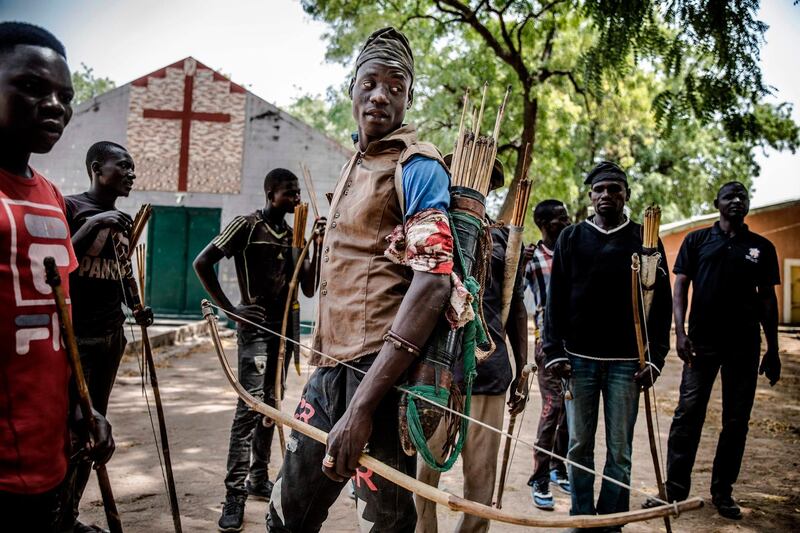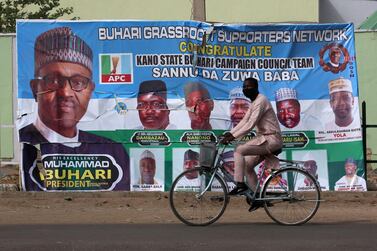With the sudden, last-minute postponement of Nigeria’s election to Saturday, the opportunities for electoral skulduggery have only grown.
Africa’s largest economy has a long history of poll violence, as it swung between democratic and military rule after independence from Britain in 1960. But this election, between the frail incumbent, Muhammadu Buhari of the ruling APC party, and the PDP’s billionaire former vice president Atiku Abubakar, could represent the second democratic transition of power in the country’s history. And for the first time, a generation of young Nigerians who have known only democracy will cast their votes.
Since both candidates are Muslims from the north, few expect the religious and communal violence that has killed hundreds in previous elections. But with the election too close to call, and both parties pursuing victory at all costs, reports of shady election tactics abound.
Nigerian political candidates have long used food, clothing and even cash handouts to win votes, but the problem has grown in recent years.
“Vote buying became more prominent last year during the Ekiti and Osun gubernatorial elections,” said Leye Komolafe, an election observer in south-western Oyo state. “Having tested it there, politicians are now aware that it works.”
He added: “Unlike in previous elections, political parties are not spending as much as they did during campaigning. This could suggest they are waiting to buy votes.”
Unconfirmed rumours abound that voter cards are being purchased by parties in the Muslim majority north – the primary battleground in this election, given the two candidates’ backgrounds – for as much as 30,000 naira ($83).
For the 87 million Nigerians – or half the population – living on less than $1.90 a day, that would constitute a small fortune.
Mr Komolafe said he expected to observe voter fraud on election day, including people using other voters' identification.
Goods including hats, rice and chilli powder bearing the faces of senate candidates and party logos have been distributed to voters nationwide.
Vote buying will likely be most evident on election day. "In the end, the vote will come down to which candidate is able to mobilise their supporters on the day," Ed Hobey-Hamsher, an analyst at risk consultancy firm Verisk Maplecroft, told The National.
A sophisticated social media campaign is being waged to swing young voters. Late last year, Attahiru Jega, the former chairman of Nigeria’s Independent National Electoral Commission (INEC), warned of the rising threat of fake news and called for stiffer laws against disinformation on social media.
Scores of young men and women have reportedly been employed to create fake Twitter accounts promoting party agendas. In the post-election period, they could be used to amplify the unverified election results that are typically disseminated by political parties to declare victory.
Other tactics being employed are decidedly more low-tech. A fortnight ago, an INEC office in central Plateau state was torched, destroying nearly 6,000 voter cards.
The election is fought on two key issues: security and the economy.
Nigeria might be the continent’s largest economy, biggest oil producer and most populous nation, but its growth has been sluggish, due to corruption, insecurity and Mr Buhari’s ill-judged foreign exchange policies.
Inequality is rife: as the wealthy swan around waterside Lagos, most Nigerians are struggling to get by. Unemployment is high, while more people live in extreme poverty in Nigeria than anywhere else on earth.
On the security front, the country is facing a series of violent insurgencies. Extremist Islamist group Boko Haram’s insurgency in Nigeria’s troubled north has killed as many as 20,000 people since 2009 and sent thousands fleeing to neighbouring Cameroon.
Meanwhile an affiliate group, Islamic State West Africa province, has grown in both stature and brutality, briefly seizing the small town of Baga in late December.
An equally violent – albeit less notorious – episode is ongoing in Nigeria’s agricultural middle belt, where resource scarcity has fuelled clashes between mostly Christian farmers and nomadic Fulani herdsmen. It is a sensitive issue for Mr Buhari, himself a Fulani Muslim, who has been accused of not doing enough to stop the violence, which killed some 1,300 people in the first half of 2018, six times more than Boko Haram.
In the south, oil militants carry out attacks, while a secessionist movement in the Niger Delta rumbles on. Across the country, bandits and kidnappers operate with abandon.
Although there are 73 presidential candidates, bringing security and prosperity to Nigeria will fall to either the ailing Mr Buhari, a former military ruler during the 1980s who has spent months of his first term on medical leave in London, or the comparatively spritely Mr Abubakar, 72, who faces accusations of corruption and has contested three previous elections.
In December, Mr Buhari was forced to publicly deny rumours he had died and been replaced by a Sudanese imposter.
Since both men are political insiders, they have struggled to campaign on a platform of change. And with Mr Abubakar emerging as a slight favourite, international observers are concerned that whoever loses will challenge the result in court – or worse, incite violence among their supporters.
Three weeks prior to the election, Mr Buhari suspended the country’s chief justice – who would have ruled on an election challenge – pending corruption charges.
“Mr Buhari has never been a full-convert to democratic norms, preferring the autocratic leadership style that he enjoyed as military head of state,” said Mr Hobey-Hamsher. “There is a high risk he will not accept defeat if it comes.”






